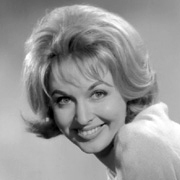
Nyree Dawn Porter
The Napier-born daughter of a butcher and a painter might seem an unlikely candidate for international stardom, but when The Forsyte Saga began screening on BBC2 in 1967, Nyree Dawn Porter was being seen by at least 100 million people worldwide.
Born Ngaire Dawn Porter, she would later change her name to the phonetic Nyree for practicality’s sake — few people outside of New Zealand could pronounce it. Porter began acting as a child, then taught ballet after leaving school. After winning a small comedy role for theatre group The New Zealand Players, she went on to tour the country with the company, in everything from Shakespeare to musicals.
At the behest of a friend, she entered the 'Miss Cinema Talent' competition run by British company Rank. Her prize for coming first was a round-the-world trip, and a test shoot in London. Although the test shoot was probably more of a token award than a real career prospect, Porter opted to stay on in London, and try to make a go of acting in England.
She began acting in the West End in 1959, in play Look Who’s Here. Soon she was appearing on screen as well, with leads in feature comedies Part-Time Wife in 1961, and The Cracksman in 1963. By the time she won the lead as Emily Bovary in a 1964 BBC adaptation of Madame Bovary, she had over a dozen screen roles behind her; she had also come within inches of being cast as trailblazing heroine Cathy Gale on iconic series The Avengers. In 1966 Porter played multiple roles in period anthology series The Liars. All this would soon be dwarfed by her next period role: The Forsyte Saga, based on nine books by Nobel prize-winning author John Galsworthy.
When The Forsyte Saga was released in 1967, it was the most expensive production yet undertaken by the BBC, at a cost of £250,000. Porter was Irene Forsyte, the wife of troubled solicitor Soames Forsyte, who was played by the unrelated Eric Porter. Adding to the pressure of the series’ extravagant budget were necessarily fast turnaround times, with the last 13 episodes of the series being recorded while the first 13 were being broadcast. Only complicating matters further, Eric Porter fell ill with appendicitis during the shoot, leaving it to Nyree to film scenes on her own, responding to questions which weren’t being asked.
Despite the challenges of bringing the series to life, it became incredibly popular. Although it had begun life on the struggling BBC2, it attracted six million viewers, out of the eight million who could receive the channel, effectively trebling the channel’s previous average viewership of two million. When the series screened again on BBC1 in 1969, an estimated 18 million people tuned in for the finale.
The show's success extended as far as the United States and New Zealand. The Forsyte Saga was one of the earliest BBC series to sell to the USA and despite its plot focussing on the upper middle class, the first to screen in the Soviet Union. While estimates vary, the low figures indicate it was shown in 26 countries, with over 100 million viewers. Some estimate as high as 160 million in 55 countries. Time magazine called it “the greatest soap opera ever filmed” and it won a Special BAFTA Award in 1968.
Far from being a case of the girl from New Zealand becoming swept up in a major drama, Porter was an important, if not integral, part of the show’s success. She became a fan favourite, inspiring fan mail from viewers apparently as distant as China, largely concerned with the her screen-husband’s treatment of her. One particularly notorious scene, in which Irene was raped by her husband, even became the subject of televised discussion amongst politicians. Despite the controversy she inspired, her character became somewhat iconic. One critic even described her as “the first romantic sex symbol of the television age”, and in 1970 she was awarded an OBE for services to television. "Looking back I can see there were some ravishing photographs taken of me," Porter said of the role later, "but I just thought I had struck it lucky with a part that caught the global imagination".
After The Forsyte Saga Porter acted in a well-regarded version of Jane Eyre, then played one of the heroes across two seasons of Euro-spanning adventure series The Protectors, a rare live-action venture from Thunderbirds creator Gerry Anderson. Co-starring was Robert Vaughan from The Man from U.N.C.L.E. Porter also appeared in two anthology horror movies, The House that Dripped Blood and From Beyond the Grave, alongside the likes of Christopher Lee and Peter Cushing.
In 1980 Porter played the lead in daytime serial For Maddie With Love, as a woman who discovers she only has a few months to live. Six years later she acted in an acclaimed BBC production of David Copperfield. After many stage roles, including productions of As You Like It and Twelfth Night, she played ballerina Margot Fonteyn in 1998 biographical film Hilary and Jackie, about English cellist Jacqueline du Pré.
Nyree Dawn Porter passed away in London on 10 April 2001. She was 65.
Profile written by Simon Smith
Sources include
Anthony Hayward. ‘Forever Irene in The Forsyte Saga’ (Obituary) - The Independent. Reprinted in The Evening Post, 19 April 2001
Dennis Barker, ‘Nyree Dawn Porter’ (Obituary) - The Guardian, 12 April 2001
Russell Davies, ‘Why we can’t get enough of The Forsyte Saga’ - The Telegraph website, 30 January 2016
Richard McGinlay, Alan Hayes and Alys Hayes, Two Against the Underworld - the Collected Unauthorised Guide to The Avengers Series 1 (Hidden Tiger, 2015)
Unknown Writer, ‘Nyree Dawn Porter’ (Obituary) - The Telegraph, 12 April 2001
Unknown Writer, ‘Donald Wilson, 91; Adapted ‘Forsyte’’ (Obituary) - The New York Times, 5 May 2001
Unknown Writer, 'Actress Nyree Porter dies aged 61' (Obituary)- The Daily Mail, April 2001